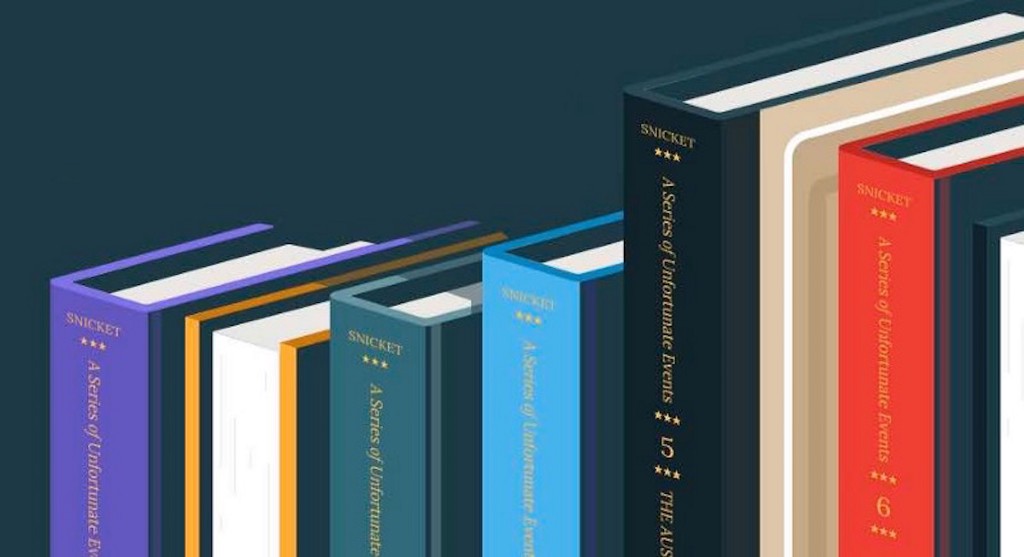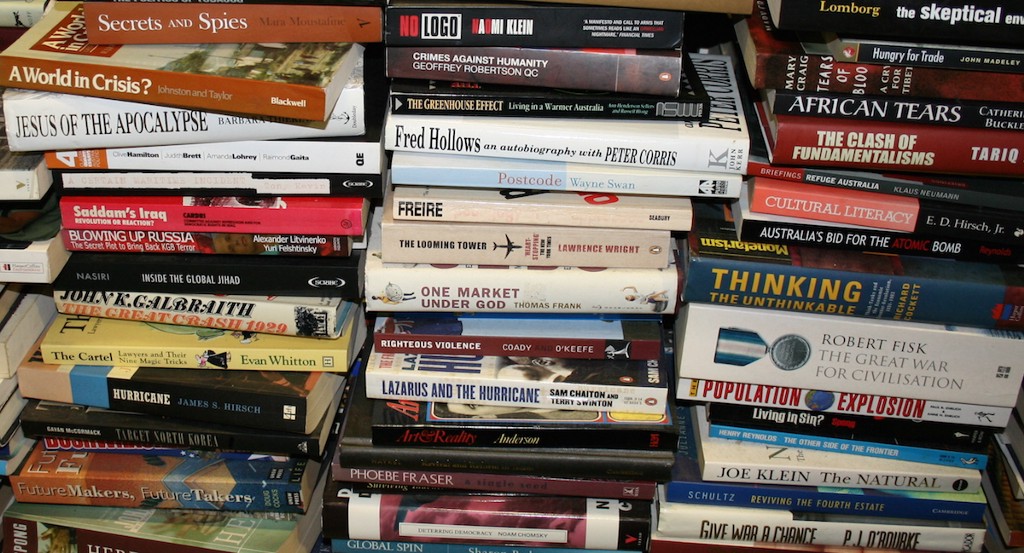Books & Culture
Relearning How to Read in the Age of Trump
After the 2016 election made my relationship with reading feel adversarial, I taught myself to take pleasure in literature again

I n 2005, I was in a small, empty airport in Darjeeling, India, and wandered into a tiny bookshop that had very few books. One of the books, unbelievably, was Mein Kampf — the Mein Kampf, by the Adolf Hitler. What shocked me wasn’t that the book was one of the few books chosen to be on the shelves. I’d learned over the years how unfortunately compatible fascism is with modern Indian society. The bigger shock was that I was face to face with this book for the first time in my life.
I wondered what would happen if I pulled it off the shelf and opened it. I imagined myself in Germany in the late 1920s, reading this book and becoming indoctrinated into an ideology that would lead to my participation in genocide. Without historical hindsight, would I be able to understand and evaluate the argument Hitler was making and come out of that experience with my critical and moral faculties intact? If anyone had been looking, I probably would have left it alone, but there was no one else in the bookshop. I nervously took Mein Kampf off the shelf, opened it up to random pages, and started reading. During the few minutes that the book was in my hands, Hitler’s views on racial hierarchies were easy to find and clearly stated. I immediately wondered how Germans could have said they didn’t know what the Nazis were doing. The logic of it was right there in this book. I didn’t want to keep reading, but I think about this moment all the time: about the act of reading and what it means to a life.

Sometime before or after the 2016 election, I kept seeing articles resurface about how reading novels develops empathy. This shouldn’t surprise us. In fact, I believe it is because of this, not in spite of it, that a whole subsection of the population — the target audience of Fox News and rightwing talk radio — has been conditioned not to read, or at least not to read literature that challenges an ideology of exclusion and hate. The crisis of the Trump presidency is, in part, a crisis in the country’s reading culture: a crisis of literacy, intellectual engagement, and critical thinking. Unfortunately, it is not a crisis that only afflicts Trump’s base. It seemed that as a country, we had lost sight of how and why we read. I wondered if there was a unifying theory of reading, a way for at least a significant number of us to examine our reading habits and perhaps develop a best practice for reading in difficult times.
Trump’s election plunged me into my own reading crisis. An avid reader since adolescence, I suddenly couldn’t finish a single novel, and gave up even trying about halfway through the year. Instead I read articles that came to me through social media, articles that were meant to give us the information we needed to navigate this strange new world, but this, too, left me hollow. As we would learn later, with revelations about how much of a war zone the social media landscape became during the 2016 elections, the information we were getting through social media needed to be vetted, but vetted by whom? I teetered back and forth between unquestioning acceptance (click share!) and hypercriticism, finding in the end that I didn’t actually have the tools to evaluate the truth or authority of any given article, that I was depending too much on whether this article came from a “trusted” source like the New York Times, even knowing how fallible the New York Times has been. I was starting to feel that I had no power or free will as a reader, and I could not protect myself against the various mechanizations and manipulations that unscrupulous forces were trying to inflict through the written word.
The crisis of the Trump presidency is, in part, a crisis in the country’s reading culture: a crisis of literacy, intellectual engagement, and critical thinking.
I wondered if I had, in fact, forgotten how to read. Reading had taken on a new weight, not just for me but for others in my circle as well. What we read, how we read, what we recommended that others read, had new consequences that were amplified by social media and global politics. Suddenly reading was not just an act of personal enjoyment or edification. We learned, as a society, that reading, or not reading, has real life consequences.
When it comes to literacy and Trump’s presidency, attention has been mainly focused on his reading and writing habits. It’s generally accepted that he’s a tweeter, not a reader. Even before he was elected, he was quoted saying he made decisions based on “very little knowledge other than the knowledge I [already] had, plus the words ‘common sense,’ because I have a lot of common sense and I have a lot of business ability.” Beside him is a vice president and other members of the cabinet who seemingly read nothing but the King James Bible and are actively destroying the country’s (secular) public education system. In other words, it’s not enough for them to be functionally illiterate, to govern without the benefit of reading. They’re determined that the rest of us forget how — or never learn.
How did we get to a place where someone like Trump could be considered a legitimate candidate for president? It’s as if the entire country failed the ultimate high stakes test. I’m not one of these people who thinks reading alone can save the world, but whether we read, what we read, and most importantly, how we read does matter.
I’m not one of these people who thinks reading alone can save the world, but whether we read, what we read, and most importantly, how we read does matter.
Even before the election, this was a contentious issue. Questions of diversity, representation, and privilege were being (somewhat) debated in the literary community. After the election, the power of text to manipulate behavior, especially on social media, added a new dimension to the question of what to read, and gave us new reasons to narrow our reading choices and distrust unknown sources. When my desire to read broke down last year, it was mainly because I felt overburdened with emotional and intellectual clutter every time I tried to engage with a new book or article, for reasons that aren’t entirely clear to me. After a while, out of sheer frustration, I craved a return to some fundamental way of reading that could help me regain a nourishing relationship with literature. I began to think about myself as a student of reading again.
Until 2016, for almost 20 years I had been an elementary school teacher of mostly first and second graders. I spent most of the school day guiding children through literacy activities that were designed to be instructive and enriching. During this time, there was ongoing controversy surrounding the pedagogy of literacy learning. The process of gaining literacy, of making meaning from print, is incredibly intricate. As a classroom teacher, I observed the numerous factors that interfered with a student’s literacy development. A child could be a perfect decoder, appearing to read with fluency, but have little comprehension of what they read. Conversely, a child could comprehend high levels of text when it was read aloud, but could not remember phonetic rules with enough consistency to be able to read or comprehend a text independently. A good reading teacher learns how to identify issues that could be interfering with a child’s literacy development: lack of prior knowledge, attention, vocabulary, disruptions with receptive and expressive language, learning disabilities and other stressors in a child’s life such as hunger. Not to be overlooked is the educational trauma caused by high-stakes testing, which the National Council of Teachers of English called a “usurpation of the English Language Arts curriculum.” High-stakes standardized tests turned reading into a vulgar transaction between student and institution, and continue to rob millions of young people of any compelling reason to read.
How ‘The Remains of the Day’ Helped Me Understand Brexit and Trump
I started re-examining how, as a teacher, I used to help children construct meaning from text. This, fundamentally, is what reading is. Without meaning, without comprehension, reading has no purpose. Part of comprehension involves the context that lies outside of the text — perhaps in the author’s life, or the historical times in which the text was written, or in our own experiences or beliefs, but before that we must deal with the content of the particular thing we are reading. When I was teaching, I continually had to direct students back to the text because they were constantly veering away from it, toward their prior experiences or deeply ingrained beliefs. As adult readers, we are not much different.

I decided to revisit one of the touchstones of my reading curriculum, Questioning the Author: An Approach for Enhancing Student Engagement with Text. Although I’ve always found this title misleading, this book was an invaluable resource for teaching students how to read for meaning and fully engage with any genre of text at any level. The method is not actually about questioning the author in a critical or contextual sense but asking ourselves as readers: What is the author saying and why are they saying it in this way? It doesn’t negate a critique or personal affinity with the text, but ironically, despite the fact that the author’s role is made explicit, including the knowledge that authors are fallible, the relationship is with the text, not the author. There is much more to this as an instructional method, and for people who are curious about how it is applied in the classroom, there are informative and entertaining videos online.
But as I was re-learning this myself, I found that my approach to reading was changing quite rapidly. I realized how much, during my crisis period, I had been entering texts as a combatant or an ally, not as a reader. If my first aim was to inhabit the writer’s perspective, to assess what the writer was saying and how they were saying it, worlds opened up for me again. I had been trying to evaluate narratives and arguments I had not fully grasped, putting the cart before the horse. Once comprehension was my primary goal, or in other words, once I refused to burden myself with anything but comprehension of the text at hand, my critical skills also improved.
During my crisis period, I had been entering texts as a combatant or an ally, not as a reader.
It’s an interesting paradox to consider the author and negate the author within the same process. Until I actively tried to apply this method to my own reading, I hadn’t fully grasped that the author we question as readers is not an individual personality but an authorial entity, the creator of the content in front of us. As a writer myself, it was difficult for me to erase the persona of the writer, especially if I was reading work by writers I knew personally. I remembered how little my students cared about the lives and creative processes of our favorite authors. As much as I always thought this would interest them, it rarely did, and on the few occasions they got to meet an author, what thrilled them was a chance to discover new things about the stories and characters they loved. This purity of experience had become foreign to me. In the age of celebrity and the internet, and my own entry into the writing world, the author had become more important than the text.
The basic initiating query in Questioning the Author — “what is this author trying to say?” — became a kind of healing mantra for me. It covered a lot of ground, allowing me to stay in the moment and read with more engagement. If I found myself resisting reading something that was out of my comfort zone, it helped me to remember this mantra before I dove in. My responses to what I was reading were less murky, more grounded in what was actually on the page. My thoughts and responses were clearer, and if I judged a piece harshly in the end, I could better articulate why. I also became more adept at noticing what was missing, or what the author had intentionally or unintentionally left out.

This is an ongoing process of improving my reading practice, one I had to undertake because reading, more than anything else, has allowed me to expand my knowledge of the world beyond my immediate experiences. Reading a diverse range of material is a pathway to empathy and critical thinking, and as such, we should all strive to do it better. I wonder sometimes if there is a bullet-proof checklist for us to follow that allows us to read in the most thoughtful and intelligent way possible. I never found one as a teacher and I don’t think it exists, not in a linear way. As much as we might be able to set aside an author’s life experience as we read their work, we can’t set aside our own. How we absorb content is complicated by what we already know and believe. It takes effort, sometimes enormous effort, to overcome obstacles to understanding and embracing new material. It takes intention, and this is what Questioning the Author teaches effectively, how to read with the intention of understanding. With a world that is changing as rapidly as ours, with so much new information coming our way constantly, the intent to comprehend before we evaluate, before we click share, before we make our judgements about what is going on, could make a huge difference to how we function as a society.
How we absorb content is complicated by what we already know and believe. It takes effort, sometimes enormous effort, to overcome obstacles to understanding and embracing new material.
I don’t know what to do about all the people who refuse to read a novel or think they have nothing to learn from other people’s stories or perspectives. As a society, I don’t know how far we can move forward without solving that problem, but we can start by dealing with our own fears about reading. I know that I wasn’t alone when I wondered in 2017 if I was reading the right things for this moment. What if I was reading a lie, or being led down a wrong path? These are valid fears, but the solution is not to ask others to filter and limit our reading choices but to become adept at comprehending and evaluating content for ourselves. This can be an individual and a collective endeavor. My experience as a classroom teacher has shown me how powerful it is to construct meaning from a text through discussion with others, so my manifesto is this. Together or alone, in these times, let us read fearlessly.










